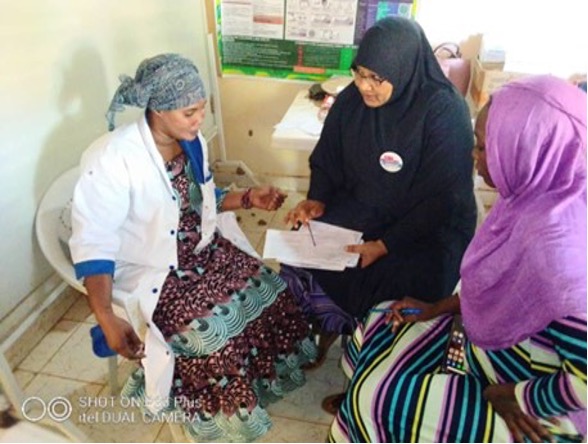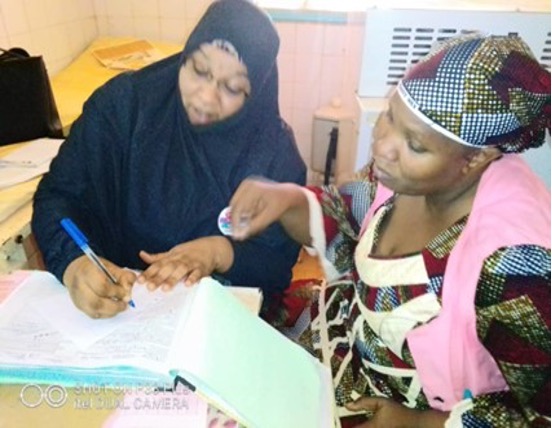Experienced Midwives Improve Quality of Care with Peer-to-Peer Training
Published on May 2, 2023
By Fatimata Akli, Maternal and Newborn Health Advisor, MOMENTUM Integrated Health Resilience Niger
While others might be overjoyed, I am worried when I see pregnancies in my native Niger, since the majority of women here do not receive prenatal care. Maternal and neonatal health is a major health issue, and the maternal and perinatal death rates are still worrisome despite the efforts being made.
I see this through my role as a maternal and newborn health advisor for MOMENTUM Integrated Health Resilience, a project that started in Niger about two years ago. My work involves on-site training, monitoring, and supporting midwives in MOMENTUM-supported facilities and communities, and I also work closely with nurses and midwife coaches.
The midwives and nurses that we work with at 107 health centers across the Takoua region are employed by the country’s Ministry of Public Health, Population, and Social Affairs. Midwives are the first persons in contact with pregnant women and new mothers, and I help give them the best technical skills, knowledge, and good practices to effectively promote maternal and neonatal health.

For example, Fiddatah Abdouramane has been a midwife for eight years at the state-run Founkoye Integrated Health Center in Tahoua, in southwest Niger. Training that we provided through MOMENTUM in late 2022 has significantly changed how she approaches her duties. Fiddatah says: “I did the delivery and counseling in my own way before. I did not fill in the (patient) cards well. I did not classify them by appointment date, and when women came to see their files, I did not have an active list. They were all scattered in a cabinet.”
But she tells us now how things have improved, “That was all before your training and supervision. Your explanations and the practice we have had, the coaching of uterine contractions, monitoring the patient’s vital signs, and following all the items on the partograph (a chart that tracks observations of women in labor) allow me to follow the labor and delivery of all my patients better.”
The World Health Organization recommends that all mothers and babies receive postnatal care within 48-72 hours of birth. However, here in Niger, only 34 percent of women receive this postnatal care, according to UNICEF. Training midwives in quality postnatal care is a key strategy to improve the health of mothers and their newborns.
USAID investments in maternal and newborn health are designed to train providers to deliver care that complies with established clinical standards and promotes dignity and respect. Midwives who are well-trained in antenatal consultations, emergency obstetrical and neonatal care, postpartum contraception, and communication techniques for behavior change can help to provide a smooth pregnancy, childbirth, and postpartum and newborn care. They can also monitor mothers and babies and detect and respond to health problems. This is important in a country like Niger, where the infant mortality rate, although greatly reduced in recent decades, is still 60 per 1,000 live births,1 and maternal mortality is 441 per 100,000 live births.2 MOMENTUM Integrated Health Resilience works specifically in fragile settings, and we have many areas like this in Niger, where events like floods or conflict can greatly disrupt health services.

Since the latter part of 2022, MOMENTUM has provided support for on-site training for 62 health workers in Tahoua, including 37 midwives. In the regional center of Dosso, training involved 70 health workers, including 33 midwives. An additional 16 midwives and two experienced nurses (consultant coaches) were trained in coaching techniques to assist the midwives.
MOMENTUM also engaged 18 experienced health workers as quality improvement coaches (half in Tahoua and half in Dosso), in addition to MOMENTUM technical staff. All work on-site or “in situ” with midwives on an ongoing basis.
We can see that this type of in situ supervision is cost-effective for midwives because it is less costly than traditional classroom training. And in situ supervision strengthens health systems to expand the coverage and use of quality health services, because the midwife is trained in the workplace.
We have plans under consideration, although they are not yet approved for action by USAID and our Ministry of Health, to expand the number of health workers and midwives in health facilities. Most facilities have only one or two midwives on duty, along with several other staff, depending on the facility’s size. The first phase of the plan provides for the deployment of coaches in 33 health centers in Dosso and 37 health centers in Tahoua.
After each in situ supervision activity, I feel honored to make a positive change in improving the delivery of quality services by midwives. Strengthening the technical skills of service providers leads to quality care that contributes to the reduction of avoidable maternal and neonatal deaths, increases the use of health facilities by mothers, and improves resilience in health systems to protect vulnerable segments of the population.
Footnotes
- World Bank figure for 2021: https://data.worldbank.org/indicator/SP.DYN.IMRT.IN?locations=NE
- World Health Organization figures for 2020: https://www.who.int/publications/i/item/9789240068759

